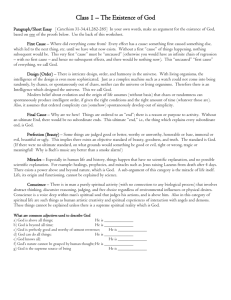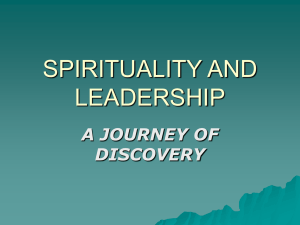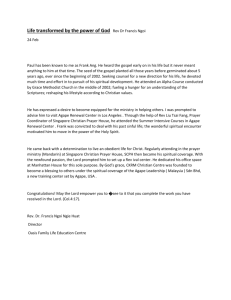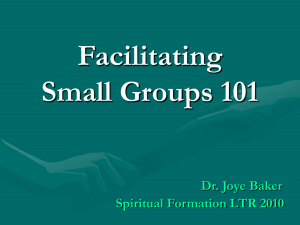UU Tradition Service and Spirituality
advertisement
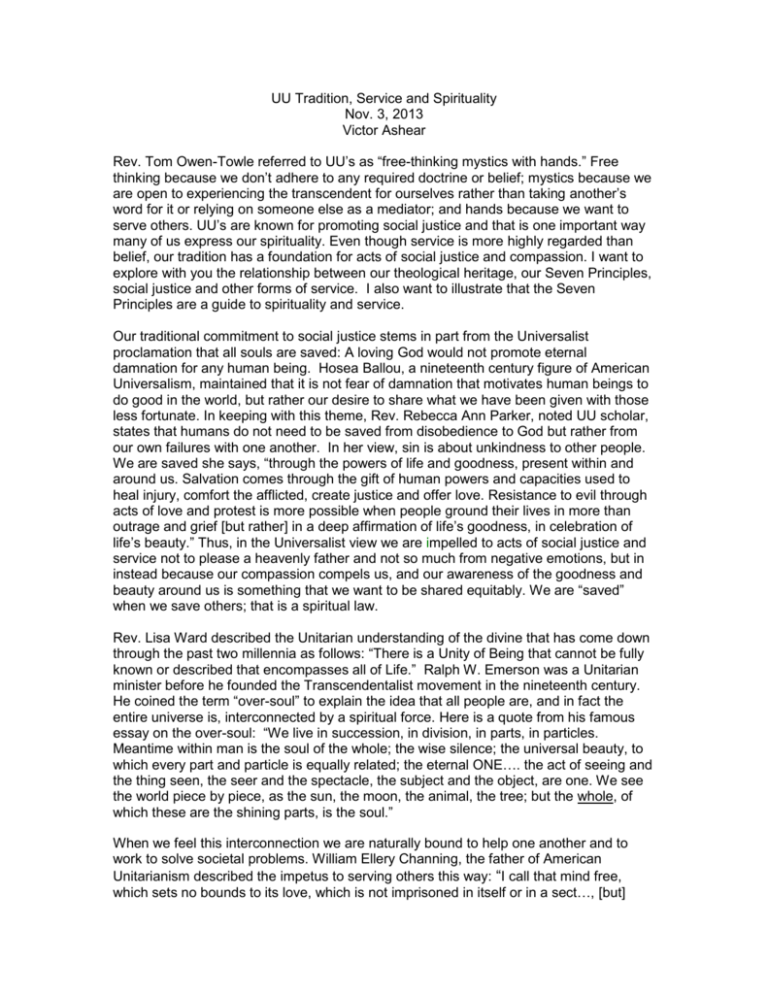
UU Tradition, Service and Spirituality Nov. 3, 2013 Victor Ashear Rev. Tom Owen-Towle referred to UU’s as “free-thinking mystics with hands.” Free thinking because we don’t adhere to any required doctrine or belief; mystics because we are open to experiencing the transcendent for ourselves rather than taking another’s word for it or relying on someone else as a mediator; and hands because we want to serve others. UU’s are known for promoting social justice and that is one important way many of us express our spirituality. Even though service is more highly regarded than belief, our tradition has a foundation for acts of social justice and compassion. I want to explore with you the relationship between our theological heritage, our Seven Principles, social justice and other forms of service. I also want to illustrate that the Seven Principles are a guide to spirituality and service. Our traditional commitment to social justice stems in part from the Universalist proclamation that all souls are saved: A loving God would not promote eternal damnation for any human being. Hosea Ballou, a nineteenth century figure of American Universalism, maintained that it is not fear of damnation that motivates human beings to do good in the world, but rather our desire to share what we have been given with those less fortunate. In keeping with this theme, Rev. Rebecca Ann Parker, noted UU scholar, states that humans do not need to be saved from disobedience to God but rather from our own failures with one another. In her view, sin is about unkindness to other people. We are saved she says, “through the powers of life and goodness, present within and around us. Salvation comes through the gift of human powers and capacities used to heal injury, comfort the afflicted, create justice and offer love. Resistance to evil through acts of love and protest is more possible when people ground their lives in more than outrage and grief [but rather] in a deep affirmation of life’s goodness, in celebration of life’s beauty.” Thus, in the Universalist view we are impelled to acts of social justice and service not to please a heavenly father and not so much from negative emotions, but in instead because our compassion compels us, and our awareness of the goodness and beauty around us is something that we want to be shared equitably. We are “saved” when we save others; that is a spiritual law. Rev. Lisa Ward described the Unitarian understanding of the divine that has come down through the past two millennia as follows: “There is a Unity of Being that cannot be fully known or described that encompasses all of Life.” Ralph W. Emerson was a Unitarian minister before he founded the Transcendentalist movement in the nineteenth century. He coined the term “over-soul” to explain the idea that all people are, and in fact the entire universe is, interconnected by a spiritual force. Here is a quote from his famous essay on the over-soul: “We live in succession, in division, in parts, in particles. Meantime within man is the soul of the whole; the wise silence; the universal beauty, to which every part and particle is equally related; the eternal ONE…. the act of seeing and the thing seen, the seer and the spectacle, the subject and the object, are one. We see the world piece by piece, as the sun, the moon, the animal, the tree; but the whole, of which these are the shining parts, is the soul.” When we feel this interconnection we are naturally bound to help one another and to work to solve societal problems. William Ellery Channing, the father of American Unitarianism described the impetus to serving others this way: “I call that mind free, which sets no bounds to its love, which is not imprisoned in itself or in a sect…, [but] which delights in virtue and sympathizes with suffering wherever they are seen, which conquers pride, anger, and sloth, and offers itself up [willingly] to the cause of mankind.” As Ronn explained in his recent talk, self-interest aligns with social conscience. So from the Unitarian side of our theological heritage we engage in service to others as an extension of awareness of our spiritual connection to one another and the spirit of all life. And when we serve we help ourselves because we connect. When we connect we are free. Everyone has experienced the pleasure that comes from seeing good result from help we have given to others. Here are a few historical examples from our faith tradition that stood for justice: Emerson himself was a passionate speaker on many social justice issues including, anti-slavery, women’s rights and quality public education for all. The Unitarian Henry Bergh founded societies for the prevention of cruelty to animals and children in the 1860’s and 70’s. The Universalist Church as a whole opposed slavery as early as 1790 and promoted women in the clergy in the 1800’s. Contemporary UU’s have marched to oppose unjust wars, racial injustice, unequal treatment of women, gender preference inequality, immigration injustice, environmental harm and other human rights causes. I want to turn now to the Seven Principles. Unitarian and Universalist teachings and practices of the past led to their creation. You will note that nowhere in the Seven Principles does the word “God” appear. The Principles are not dogmatic. How much do these Principles embody the idea of “service as a spiritual path?” As I hope to show, the principles are a call to service and action, stemming from a core of ethics, love, concern for humanity, and for our Earth. Taken as a whole they are guide to a spiritual life. Our first principle states that we affirm, “the inherent worth and dignity of every person.” We are invited to accept others regardless of their religion, politics, sexual orientation, culture, race, mental capacity or other qualities people cannot chose for themselves. As Rev. Marilyn Sewell stated, “our first principle strongly implies that we are called to create justice where justice does not exist. If all people do have worth and dignity can we allow some of them to live without hope? Can we allow some people to go hungry and without shelter? Can we turn our eyes away from discrimination?” She goes on to say, “this principle calls us into right relationship with others. It calls for profound respect even when we differ with the views and behavior of others. It calls for gentleness and forgiveness.” Our second principle affirms, “justice, equity and compassion in human relations.” Former UU President William Shultz stated, “Spirituality is the inspiration for all politics which redeems. For once I have looked on the abundance of creation, I cannot rest while others, caught up in its flaws, are deprived of the view.” This is the Universalist perspective. Rev. David Williams said we are led to promote the second principle because, “We are joined together by a mystic oneness whose source we may never know but whose reality we can never doubt.” Recall here Emerson’s over-soul, the Unitarian view. Compassion is the concern we feel for others in distress that leads to action. Compassion is a spiritual force that binds people together and that encourages response to inequity and injustice. The Dalai Lama said. “My religion is compassion.” Buddhist author Jack Kornfield said, “Compassion allows us to pass through our hearts with the great paradoxes of life, love, joy and pain. When compassion opens us up, we give what we can to stop war, heal the environment, to care for the poor, to care for people [who are sick], to save the rainforests.” Rev. Richard Gilbert defines equity as treating others with fairness. Regarding justice, Rev. Gilbert said that while compassion is felt up close, “justice is love operating at a distance.” It implies a fair distribution of social benefits and burdens. “Justice allocates resources based on need rather than greed.” Last summer Janet and I attended a week of lectures at Chautauqua on the subject of “markets and morals.” A few speakers there argued that markets left to their own devices would eventually create equity. But most took the view that it is up to citizens to demand that markets behave equitably and justly. The improper and immoral mortgages that led to the financial collapse a few years ago are a powerful example of how markets need to be regulated to achieve justice. Working for justice and equity and using compassion helps to create “Beloved Community,” popularized by Rev. ML King. Beloved Community “expresses the liberal religious concern for compassion, equity and justice. To refuse to act in life is to abdicate our role as spiritual and moral beings,” Gilbert says. When we work to help create Beloved Community we all benefit. Our third principle affirms, “ acceptance of one another and encouragement to spiritual growth in our congregations.” This principle calls on each of us to help create opportunities in our fellowship to encourage spiritual growth. Embedded in this principle is the idea that as unique individuals we are going to approach spirituality differently. In other faith traditions the path is presumed to be the same for all followers. In our case as UUs we need to be able to support one another even when the beliefs, and practices of others are different from our own. This may be especially true when visitors are in our midst. We need to educate each other without preaching. We must be able to disagree respectfully and to be open to diversity. Most importantly, we need to be able to listen without passing judgment. As Rev. Carolyn Owen-Towle stated, “Our covenantal faith requires us to make a commitment to support and encourage one another. We can’t do it alone.” This is what our fellowship’s covenant states as well. The fourth principle is the encouragement to engage in “a free and responsible search for truth and meaning.” At its heart this principle espouses a solitary, soul-searching activity. In the absence of a professed dogma required for membership into our faith community we have chosen to take on the challenging task of discovering truth and meaning for ourselves. And yet even in this self-focused task, as Rev. Fredric Muir states, “it is not done alone…it is done in community.” As NPR reporter and UU Margot Adler stated, “There are times when gut and heart and intuition are not enough and it’s important to have a reality check, people who will bring you down to earth.” So helping one another with our individual searches is an additional form of spiritual service that the principles encourage us to provide. We benefit from being open to the feedback others in our fellowship can give us on our spiritual journeys. I think there are also many times when we need the confirmation that others experience things in a way similar to us. Differences in spiritual belief can fracture a group such as ours but if we follow this principle with understanding, differences can be a source of greater strength and growth for all, I believe. The fifth principle affirms, “the right of conscience and the use of the democratic process within our congregations and in society at large.” This one, like the fourth and third principles, asserts that it is up to each individual to determine for herself what to believe and what is morally correct. These same ideals inspired the Enlightenment and the founding of the American democratic republic with its emphasis on freedom of religion. The UUA does not determine policies or practices or beliefs in member congregations. Although the fifth principle upholds individual choice and determination it also places a responsibility of service to our congregations and to the larger society. It calls upon each of us to be defenders of religious freedom and the right for each to have a voice. Consider for example voting rights in our country. The fifth principle requires us to act to preserve this right. When we stand for democracy and the right of conscience we are protecting our fellow citizens. We are affirming the “inherent worth and dignity” of each person. As Rev. Eric Holt stated, “Democracy is an expression of the faith in the power of human beings to shape their own lives. The spiritual unity of the human family is unrestricted by nation, race or creed. What is unique and precious to UU is that we affirm no external authority in our religious lives, not of church or creed or Bible, but hold as authoritative only the internal voice of conscience that speaks in each and every human soul.” This voice makes us accountable to others. Holt believes that conscience and democracy work together, however imperfectly. Rev. Paul Beattie said, “in religion and in life you must learn to think for yourself and act for yourself.” We grow in spirit and we become the moral, ethical and loving people we were meant to be, by courageously doing so and enabling the opportunity for others. Many Unitarians of the past were imprisoned, as Francis David was, or burned at the stake, like Michael Servetus, for their defense of the right of conscience. The sixth principle affirms, “the goal of world community, with peace, liberty, and justice for all.” This very ambitious goal obviously has service embedded within it. How can we attempt to work on such a large goal? We can work towards a greater sense of cooperation and support here in our fellowship, in our neighborhoods, in our workplaces. We can join with other likeminded people nationally and internationally who support this goal. We know this goal by another name, “Beloved Community,” a dream promoted by the Rev. King I mentioned in reference to the second principle, on justice, equity and compassion. We want to promote the rights of women, LGBTs, of racial and religious minorities, of the mentally ill, anywhere we can. We want to be “Standing on the Side of Love.” The latter slogan became the emblem for the UU stand on immigration justice in 2012 in Arizona, but now has expanded to encompass all human rights struggles. When we join together in support of the sixth principle, when we work for a better world we cannot help but feel a spiritual connection. Friends, if we are not here to help create a better world what are we here for? The UU Service Committee was established in 1939 to help refugees from Nazi Germany. Since then it has become the most visible UU program in support of the sixth principle. Here is a quote from the website: “Through a combination of advocacy, education, and partnerships with grassroots organizations, UUSC promotes economic rights, advances environmental justice, defends civil liberties, and preserves the rights of people in times of humanitarian crisis.” Usually at this time of the year our fellowship promotes the “Guest at Your Table” program that provides funding for the UUSC. The UUA has also partnered with other liberal religious entities around the world to form the “Association for Religious Freedom” to work together for the goals of peace, liberty and justice for all. Our seventh principle declares, “Respect for the interdependent web of all existence of which we are a part.” This principle is based on science; it includes ecology, the study of living organisms in relationship to their environments. It includes the relationship among subatomic particles as well as the bodies that make up our solar system. It includes the relationship among weather patterns. It includes the behavior of people in families and other groups. In addition to being a scientific principle it is also a deeply spiritual one. As a coworker of mine several years ago said, “Spirituality is about connection.” My own belief about the divine mystery is that everything is connected, the universe, the past and the future are all part if it. The psychoanalyst Eric Fromm said that we humans because of our capacity to think abstractly are disconnected from the rest of nature and our spiritual task is to overcome this separation. Fromm said,” The deepest need of [a person] is to overcome separateness, to leave the prison of aloneness.” We do this according to Fromm by acts of loving service. UU’s place such a heavy emphasis on individual rights and freedoms that it may lead us to ignore our interdependence. Arrogance may lead us to conclude we don’t depend on others. The twin psychological problems of narcissism and low self-esteem also prevent us from feeling that we belong to the human community. It is a balance of self-love and love of others that allows us to be full participants in the interconnected web. UU Rev. Barbara Merritt asserts the seventh principle is at its core a “religious statement that necessitates certain fundamental spiritual truths and disciplines.” One of these truths is the need for humility that comes when we realize that we are part of something much, much greater than ourselves. This may mean, in spite of our fierce need to do things our own way, we must sometimes defer to the needs of the group. Merritt states we need to move beyond the illusion that we are in control. Rather we are interdependent as the seventh principle states. We can find strength and purpose when we join forces with others. We come to see that the interdependent web is not always kind; people we love get sick and die, blizzards and floods occur, wars and famine occur, markets crash, etc. We need to be there for each other when tragedy strikes. “We must learn the spiritual discipline of living with respect; respectfully entering into full relationship with the many conditions and challenges of this world.” Merritt adds, “that respectful regard for the reality of existence can expand into gratitude and reverence for life.” How we relate to the world will determine what we become. As Chief Seattle famously stated, if we harm the earth we harm ourselves. If choose to love others, love will be returned. The seventh principle then embodies the law of karma, the Hindu-Buddhist concept of cause and effect. It also harkens to the New Testament statement, “As you sow so shall you reap.” Because we are an inevitable part of the interconnected web of existence we are morally bound to participate in the spiritual practice of service. This is what our UU heritage teaches as I tried to say earlier. I hope I have shown that for UU’s service and spirituality are inseparable and part of our humanity and our faith tradition. When we engage in acts of service and when we work for social justice, when we “stand on the side of love” we are most fully alive and we are fulfilling our life’s purpose. I believe that living the 7 Principles guides us to acts of service that nourishes our spirituality. These 7 Principles are as good a spiritual path as any I know of and it is one reason why I am a UU. May you all have lives of compassion and service and may they be filled of meaning and purpose.


